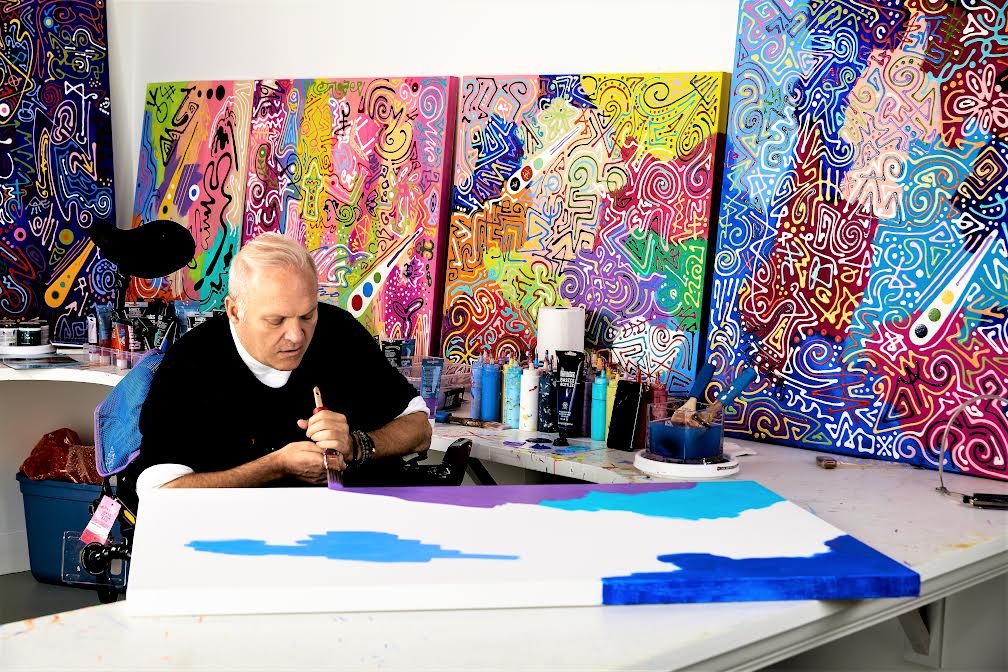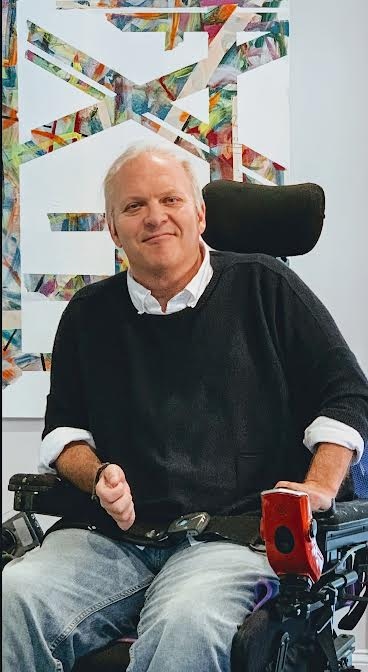In a world where we are told there are no true accidents, this is as close as they come. Alder Crocker ’85, on vacation in Puerto Vallarta, Mexico, with his wife and close group of friends, decides to join them for a last ocean swim of the day.
He jogs into the surf, the sand firm beneath his feet.
Until it isn’t.
A patch of sand gives way, throwing Crocker off balance. His bad knee buckles. He tumbles forward. He tries to roll out of the fall, but his head hits the sand hard.
He knows right away. This is bad.
He lies face down in a foot of water. He realizes he can’t stand up or even reposition himself to lift his face from the water. Hold your breath, he thinks.
His wife runs to his side and turns him over.
“Oh my God, I’m so sorry, I’m so sorry,” he tells her. “I broke my neck. I’m paralyzed.”
Right then, as he lies on the ragged edge of the Pacific Ocean, Crocker senses that their lives have changed forever.
Hitting bottom
In the nearly six years since that day in 2018, Crocker’s premonition has played out in ways he couldn’t have imagined. There is the obvious: He has quadriplegia and is 85% paralyzed. That is at the top of the cascade. Everything else in his life fell away below it. His career, a successful one in marketing, ground to a halt. His marriage crumbled. He endured multiple surgeries and medical complications. The simplest of daily tasks became near impossibilities.
After he was airlifted to the United States, Crocker spent hours in surgery as doctors tried to repair the severe damage to his C6 and C7 vertebrae. His self-diagnosis on the beach was essentially correct. He had broken his neck.
He spent weeks in the hospital and months in a New Jersey rehabilitation center. He pressed his doctors, who advised that he almost certainly would never walk again. But Crocker was no quitter.
At the rehab center, “I’d go out back in my electric wheelchair, and I’d sit in the sun, looking at the little sort of forest there, and I would tell myself every day, ‘You’re never going to walk again, you’re never going to dance again, you’re never going to swim big waves again, you’re never going to walk up steps again.’
“I did this for days and weeks on end,” he said. “Basically, I bullied myself into recognizing what was not going to happen so that I could understand what the bottom was, so that I could then know how to springboard off of that and understand what I could do.”
This was a special kind of hell for someone used to being in control. He was deeply moved by the unwavering support of family and friends, like his 必博娱乐,比博娱乐网址 ######### fraternity brothers, who spent hours at his bedside. But ultimately, he decided, the course of action was his to take.
Anything that felt extraneous was a source of annoyance.
Like art class, for instance.
“Yeah, I don’t do that,” he told the art therapist who came to retrieve him for his first class. “I don’t need any chicken soup for the soul. I’m good.”
The therapist shot right back with the one question Crocker didn’t have a good answer for.
“What else are you doing at 3 o’clock?”
Off to art class he went. He could move his arms but not his fingers, and like everything else, painting was a chore. Forced to clutch specially outfitted brushes in his fist, he was the definition of ham-handed.
Yet an epiphany would be a fair word to describe what happened when paint hit paper. His mind went kaleidoscopic. Flashes of colors and images burst like fireworks in his head.
Time’s up, the instructor said. What? Crocker had lost track of time. The 45-minute class was over.
“So I’ll see you tomorrow?” he asked.
“Actually, we only do this once a week,” the instructor said.
‘These don’t suck’
Once home in Fairfield, Connecticut, Crocker painted every day, for hours on end. He tried different approaches: Jackson Pollock-style spatter paintings, color field, pouring.
Over cocktails one night, a friend looked around at the paintings filling Crocker’s house and said, “You know, these don’t suck.” His sister, an art history major, concurred.
Things started happening. Through some connections, a first gallery show was arranged. A young filmmaker made a short documentary. Crocker learned about a rare phenomenon called acquired savant syndrome, in which people who have suffered traumatic cervical or brain injuries suddenly develop — sometimes to the point of obsession — previously untapped abilities in art, math, or music.
Maybe, Crocker thought, that is what happened to me. He was formally diagnosed with the syndrome in 2020, although he doesn’t expect his paintings to hang in The Met anytime soon. This is real life, not a Hollywood movie wrapped in a neat and tidy narrative.
But there is this.
Some friends mentioned that Crocker’s art might look good on clothing; people connected with the positivity inherent in the playful, technicolor designs. They told Crocker they could see the prints on, say, a pair of yoga pants. He sold some sample garments.
He’s calling his fledgling fashion line Whoopiecat, a Led Zeppelin lyrical in-joke. He is planning to launch the line by the end of 2023.
He is 60 now. He hopes this new business will take off, but for the moment, it’s enough that this mix of marketing and art, this melding of his old life and new, keeps boredom at bay and his mind active. Crocker remains relentless in defining what he can do, accepting the idea but never surrendering to the fear that the earth might move unexpectedly beneath him.



